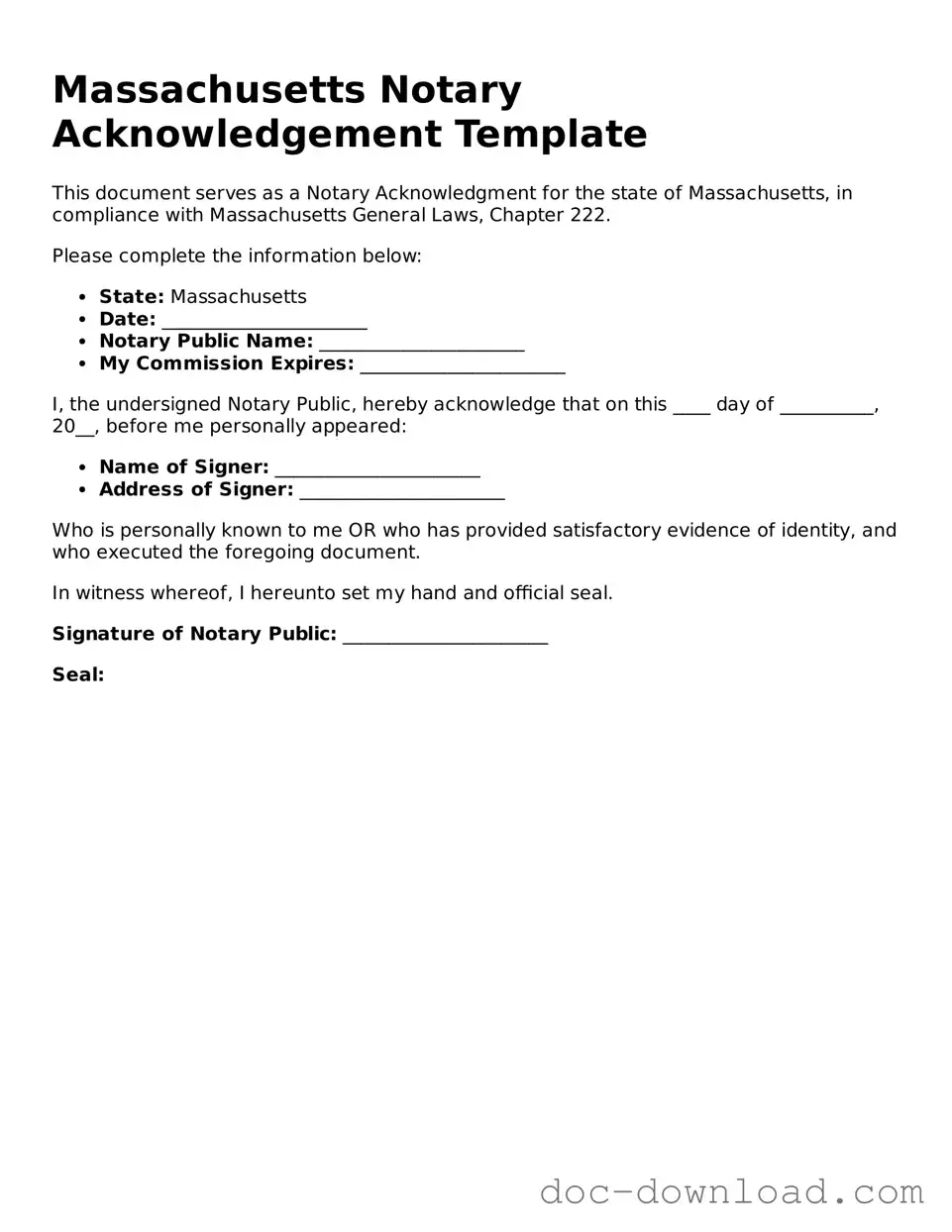Blank Notary Acknowledgement Document for Massachusetts
In Massachusetts, the Notary Acknowledgment form plays a crucial role in the legal landscape, serving as a vital tool for verifying the authenticity of signatures on various documents. This form is essential for ensuring that individuals signing a document do so willingly and with an understanding of its contents. Typically utilized in real estate transactions, legal agreements, and other important contracts, the Notary Acknowledgment requires the presence of a notary public who confirms the identity of the signer. The form includes specific information such as the date of the acknowledgment, the name of the signer, and the notary's signature and seal. By providing a clear and formal record of the acknowledgment, this document helps protect against fraud and disputes, offering a layer of assurance to all parties involved. Understanding the intricacies of this form is vital for anyone engaging in legal transactions in Massachusetts, as it not only facilitates the process but also upholds the integrity of the legal system.
Similar forms
The Massachusetts Notary Acknowledgment form shares similarities with the Affidavit form. Both documents require a signature and a notary public’s acknowledgment to confirm the identity of the signer. An affidavit is a written statement made under oath, often used in legal proceedings. Just like the acknowledgment form, it serves to validate that the person signing is doing so voluntarily and understands the contents of the document. This adds a layer of authenticity and trustworthiness to both documents.
Another document that resembles the Notary Acknowledgment is the Power of Attorney (POA). A POA allows one person to act on behalf of another in legal or financial matters. Similar to the acknowledgment form, the POA must be signed and notarized to ensure that the person granting authority is doing so willingly and understands the implications. Both documents require the notary to verify the identity of the signers, which helps prevent fraud and protects the interests of all parties involved.
The Deed is also comparable to the Massachusetts Notary Acknowledgment form. When transferring property, a deed must be signed by the seller and typically requires notarization. The notary’s role is to confirm the identity of the signer and that they are signing the document voluntarily. This process ensures that the transfer of property is legitimate and legally binding, much like how the acknowledgment form affirms the authenticity of the signer’s intent.
In the realm of boat ownership, having the correct documentation is crucial, and that's where the California Boat Bill of Sale becomes indispensable. This form not only facilitates the transfer of ownership but also ensures that both parties are protected throughout the transaction process. For those looking to engage in boat sales, filling out this essential paperwork can be easily accomplished by visiting californiapdffoms.com/.
Similarly, the Certification of Trust is another document that shares characteristics with the Notary Acknowledgment form. This document is used to provide evidence of a trust's existence and the authority of its trustee. Like the acknowledgment form, it often requires notarization to validate the signatures. The notary’s involvement helps ensure that the individuals involved are who they claim to be, thus providing assurance to third parties who may rely on the certification.
Lastly, the Bill of Sale is akin to the Massachusetts Notary Acknowledgment form. This document serves as proof of the sale of personal property. To enhance its validity, a Bill of Sale can be notarized, ensuring that the seller’s signature is authentic and that the transaction was conducted fairly. Similar to the acknowledgment form, notarization provides an extra layer of security and confidence for both the buyer and seller in the transaction.
Document Overview
| Fact Name | Details |
|---|---|
| Purpose | The Massachusetts Notary Acknowledgment form is used to verify the identity of individuals signing a document. |
| Governing Law | This form is governed by Massachusetts General Laws, Chapter 222, Section 1. |
| Signature Requirement | Signatures must be made in the presence of a notary public. |
| Identification | Individuals must provide valid identification to the notary at the time of signing. |
| Form Language | The form is available in English, but translations may be required for non-English speakers. |
| Record Keeping | Notaries are required to keep a record of all acknowledgments performed in their journal. |
| Expiration | The acknowledgment does not expire, but the notary's commission has a defined duration. |
Additional State-specific Notary Acknowledgement Forms
Missouri Notary Acknowledgement - It is an important element in the lifecycle of legal agreements.
Notarial Certificate Florida - The acknowledgment usually contains a line for the signature of the notary to officially certify the deed.
A Florida Quitclaim Deed is a legal document used to transfer ownership of real estate from one party to another without guaranteeing the property's title. This type of deed is often utilized in situations such as transferring property between family members or clearing up title issues. If you're ready to fill out the form, click the button below! For more details, visit https://quitclaimdeedtemplate.com/florida-quitclaim-deed-template.
Az Notary Acknowledgement - A Notary Acknowledgement confirms that a person has willingly signed a document.
Acknowledgement Form - The notary's seal on the acknowledgment certifies its authenticity.
Sample - Massachusetts Notary Acknowledgement Form
Massachusetts Notary Acknowledgement Template
This document serves as a Notary Acknowledgment for the state of Massachusetts, in compliance with Massachusetts General Laws, Chapter 222.
Please complete the information below:
- State: Massachusetts
- Date: ______________________
- Notary Public Name: ______________________
- My Commission Expires: ______________________
I, the undersigned Notary Public, hereby acknowledge that on this ____ day of __________, 20__, before me personally appeared:
- Name of Signer: ______________________
- Address of Signer: ______________________
Who is personally known to me OR who has provided satisfactory evidence of identity, and who executed the foregoing document.
In witness whereof, I hereunto set my hand and official seal.
Signature of Notary Public: ______________________
Seal:
